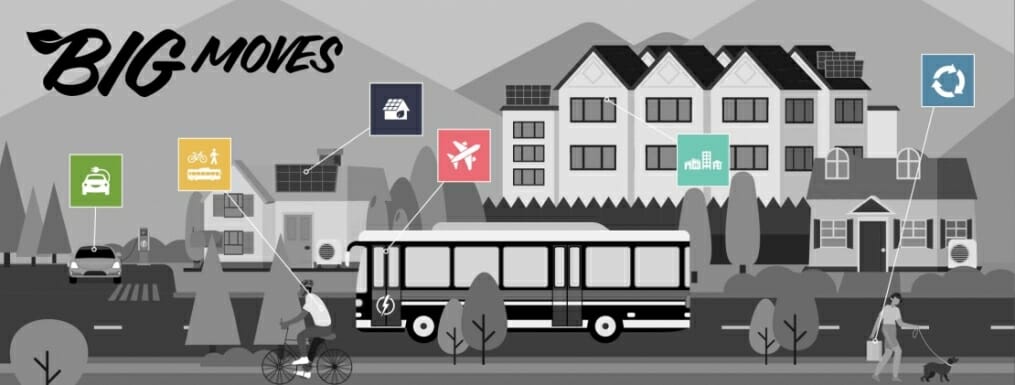
Whistler’s Greenhouse Gas (GHG) Reduction Target
Whistler’s greenhouse gas (GHG) reduction target is to reduce emissions by 50 percent below 2007 levels. By 2030, emissions should be capped at 66,500 tonnes of carbon dioxide and equivalents.
The Big Moves Climate Action Implementation Plan focuses on reducing Whistler’s contribution to climate change by lowering our emissions and improving our resilience in the context of a changing climate.
The Big Moves and Adaptation Goals
Big Moves:
- Big Move 1: Move beyond the car
- Big Move 2: Decarbonize passenger and commercial transport
- Big Move 3: Reduce visitor travel emissions
- Big Move 4: Build zero emissions buildings
- Big Move 5: Make existing buildings better
- Big Move 6: Close the loop and shift towards lower carbon consumption
Adaptation Goals:
- Adaptation Goal 1: Minimize threats from wildfires
- Adaptation Goal 2: Increase resilience to extreme weather events
- Adaptation Goal 3: Protect local ecosystems and biodiversity
Climate change impacts on Whistler
Our adaptation goal is to increase Whistler’s resilience to the impacts of climate change. The key climate changes expected for Whistler include:
- Longer, hotter, drier summers
- Milder winters with increased rain (instead of snow) at lower elevations
- Increase in frequency and intensity of heavy rain events
The RMOW is taking action to adapt to these changes, build resilience, and minimize the risks of potential negative impacts.
Purpose
The Big Moves Climate Action Implementation Plan highlights actions to achieve Whistler’s 2030 emission reduction target by reducing emissions from transportation, buildings, and waste. It also outlines how we can minimize threats from wildfires, increase our resilience to extreme weather, and protect our local ecosystems and biodiversity.
Our 2030 targets
Our main goal is to reduce Whistler’s greenhouse gas reduction target by 50 percent below 2007 levels. By 2030, emissions should be capped at 66,500 tonnes of carbon dioxide and equivalents.
Sector emissions:
- Personal transport is Whistler’s biggest source of greenhouse gas emissions, accounting for over half of the community’s total emissions. It’s also increasing, as we see more vehicle trips in Whistler. Note: Whistler only measures transport-related emissions that occur within municipal boundaries.
- Buildings make up the second largest source of emissions in Whistler, with natural gas usage accounting for most of this.
- Waste is Whistler’s best-performing sector, with emissions declining by 90 percent since 2005 due to additional composting, carbon gas capture at the landfill, and other improvements.
What is Realistic:
- Whistler’s targets are in line with the City of Vancouver and Community Energy Association.
- Whistler considers a 50 percent reduction by 2030 to be a stretch goal, as the municipality lacks the jurisdiction that Vancouver has when it comes to making changes to the building code and specifying the types of heating and hot water systems that can be installed in new and existing buildings. However, the municipality will continue to strive for that target through Big Moves to close the gap as much as possible.
Estimated impacts of Big Moves
- If successful, the combined Big Moves actions will reduce emissions by 45,300 tonnes below 2019 levels, which is 70 percent of the way towards the 50 percent reduction target.
- Figure 4 shows the estimated impact of each Big Move by 2030. Note: While the proposed target is based on 2007 emissions, reductions for each Big Move are calculated based on 2019 data. In addition, greenhouse gas emission reductions in percentage are calculated using a “Business as Usual” scenario.
- All emission reduction estimations are given as a range due to the high uncertainty and necessary assumptions for these calculations. The lower and upper limit of the emission reduction ranges are based on conservative and optimistic climate action scenarios that assume that trends on technology, funding availability, Provincial and Federal action, and public interest and pressure will decelerate or accelerate accordingly.
Background
As a mountain community that is sensitive to changing weather patterns and vulnerable to wildfires, the community has been incredibly supportive of the need to act today to meet emission reduction targets.
Whistler was one of the first communities in British Columbia to sign onto the BC Climate Action Charter in 2007, leading to the Community Energy and Climate Action Plan (CECAP). There were over 130 actions in CECAP across a wide variety of sectors that were later incorporated into our Official Community Plan and Big Moves Climate Action Implementation Plan.
Climate Big Moves were first adopted by the City of Vancouver and Community Energy Association, with the goal of sharing knowledge, resources, and experience among participating communities, helping communities reach their goals faster with proven and supported actions.
We also believe that by addressing climate change through Big Moves and adaptation goals, the quality of life for locals and the overall visitor experience will also improve.
Related files
- Whistler Climate Modelling Summary Report (PDF)
- Big Moves Climate Action Implementation Plan (PDF)
- Big Moves Strategy (PDF)
- Implementation, Monitoring, and Accountability
Get involved
Contact
For more information, contact climatechange@whistler.ca